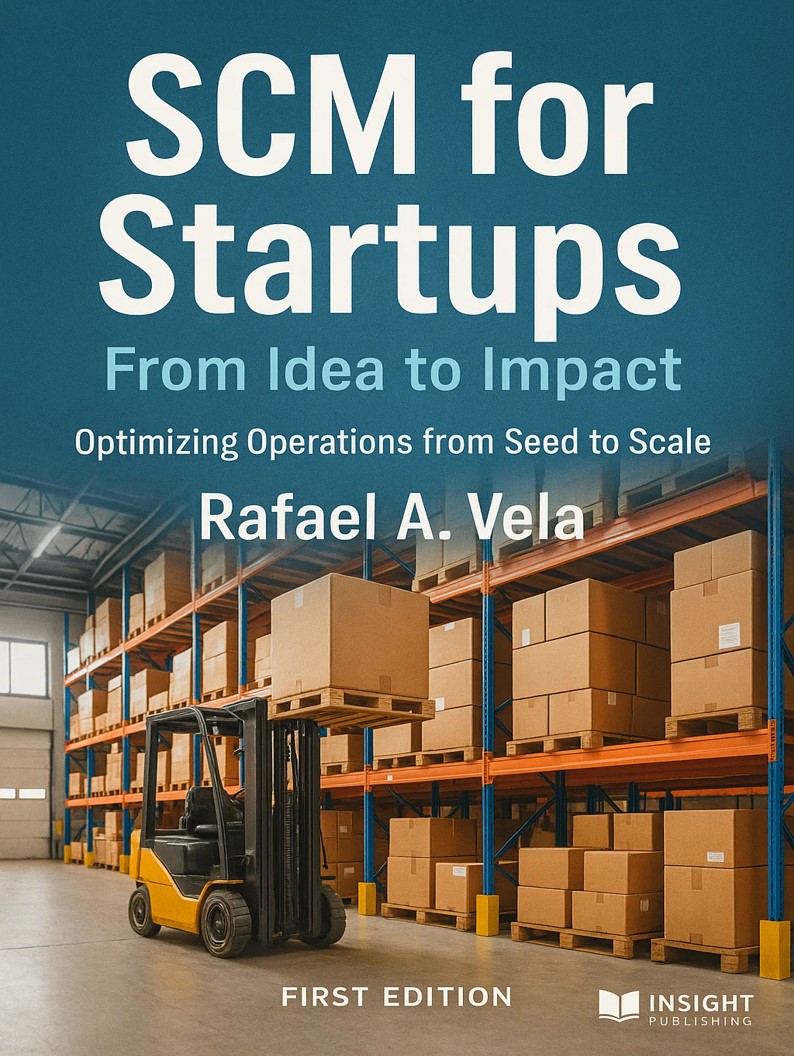
SCM for Startups: From Idea to Impact - First edition - 181 pages
Unlock the Secrets to Scaling Your Startup's Supply Chain Success
Is your startup's growth being held back by a chaotic supply chain?
You have a great idea and a growing customer base, but every step forward feels like a struggle. Inventory nightmares, surprise costs, and unreliable suppliers are the silent killers of promising startups. You know you need a scalable supply chain, but you don't know where to start.
"SCM for Startups: From Idea to Impact" is your definitive playbook for building a supply chain that fuels, not frustrates, your growth. This isn't a textbook for a Fortune 500 company—it's a practical, step-by-step guide designed specifically for the fast-paced, high-stakes world of a startup.
Inside, you will learn how to:
- Avoid the cash-flow killer of excess inventory and the brand damage of stockouts.
- Build a resilient supplier network that can grow with you, protecting your business from unexpected disruptions.
- Use lean, low-cost tech solutions to get total visibility and streamline your operations without a huge budget.
- Transform your supply chain into a competitive advantage that helps you scale efficiently and beat the competition.
Stop letting operational challenges dictate your growth.
Get your copy today and build the supply chain that will turn your vision into a successful business.
Table of Contents
Introduction: Navigating the Startup Supply Chain Landscape - 9
- Objectives of this book: Empowering startups with strategic SCM insights - 9
- Who this book is for: Founders, operations managers, and aspiring entrepreneurs - 9
- Why SCM is crucial for startup success: Turning ideas into scalable realities - 9
- A roadmap for building agile and resilient supply chains - 10
Part I: Laying the Foundation
Chapter 1: Understanding the Startup Ecosystem and SCM - 12
- What is a startup? Defining the unique characteristics and challenges - 12
- The Startup Landscape and the Role of SCM: Adapting to rapid change - 15
- The importance of SCM in early-stage development - 18
- Setting strategic goals aligned with supply chain capabilities - 22
Chapter 2: Defining Your Product and Customer Needs - 26
- Market research and customer segmentation - 26
- Product development and prototyping - 30
- Forecasting demand in uncertain environments - 34
Chapter 3: Sourcing and Supplier Selection - 39
- Identifying and evaluating potential suppliers - 39
- Building strong supplier relationships - 41
- Negotiating contracts and managing risk - 45
Part II: Building the Agile Supply Chain
Chapter 4: Inventory Management for Startups - 49
- Balancing inventory levels with cash flow - 49
- Implementing lean inventory strategies - 54
- Utilizing technology for inventory tracking and optimization - 58
Chapter 5: Logistics and Distribution Strategies - 61
- Choosing the right transportation and warehousing solutions - 61
- Managing order fulfillment and delivery - 66
- Exploring e-commerce and direct-to-consumer (DTC) models - 69
Chapter 6: Technology and Automation in Startup SCM - 76
- Leveraging cloud-based SCM software - 76
- Implementing data analytics and AI for decision-making - 81
- Exploring automation and robotics for efficiency gains - 86
Chapter 7: Quality Control and Risk Management - 93
- Establishing quality standards and processes - 93
- Identifying and mitigating supply chain risks - 95
- Building resilience to disruptions - 100
Part III: Scaling and Optimization
Chapter 8: Scaling Operations for Growth - 104
- Expanding production capacity and logistics networks - 104
- Managing international supply chains - 106
- Building a scalable SCM infrastructure - 108
Chapter 9: Continuous Improvement and Innovation - 110
- Implementing lean principles and Kaizen methodologies - 110
- Fostering a culture of innovation in SCM - 112
- Adapting to evolving market demands - 114
Chapter 10: Building Sustainable and Ethical Supply Chains - 116
- Integrating environmental and social responsibility - 116
- Ensuring ethical sourcing and labor practices - 118
- Creating a sustainable supply chain for long-term impact - 119
Conclusion - 122
- Key takeaways and actionable strategies - 122
- Embracing agility and adaptability in a dynamic market - 123
- A call to action for startup founders and operations managers - 124
- Final Thoughts: Preparing for the future
Appendices
- Achieving Product-Market Fit: Keys to Success - 127
- Building an Agile Supply Chain for Startups - 132
- Key Performance Indicators (KPIs) for Startup Supply Chains - 137
- Leveraging Technology in Startup Supply Chains - 142
- Mastering Prototyping: A Step-by-Step Guide - 148
- Risk Management Framework for Supply Chains - 153
- Scaling Your Operations: From Startup to Growth - 158
- Strategic Sourcing: Best Practices for Startups - 163
- Sustainable Practices in Startup Supply Chains - 168
- The Roadmap to a Minimum Viable Product (MVP) - 173
- Bibliography and Suggested Reading - 178
